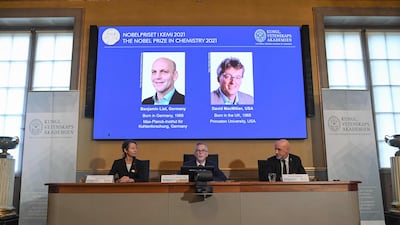A pair of scientists who discovered a way of building molecules that "made chemistry greener" have been awarded the Nobel Prize in the field.
Benjamin List, from Germany, and David MacMillan, a Scottish-born chemist who works in the US, will share the prize for creating an "ingenious tool" to make chemical building blocks.
Known as asymmetric organocatalysis, the discovery has been put to use in making medicines and capturing light in solar cells.
The invention is "as simple as it is ingenious, and the fact is that many people have wondered why we didn’t think of it earlier," said Johan Aqvist, the chair of the Nobel Committee for Chemistry.
Jurors praised the scientists for mimicking natural processes, which had once been so hard to replicate that chemists "were long stuck in the Stone Age".
The process they invented means it is less necessary to use metals in chemical reactions, which work well scientifically but can be harmful to the environment.
"Its uses include research into new pharmaceuticals and it has also helped make chemistry greener," the panel said.
Reacting to the announcement, Dr List said the award came as a “huge surprise" when he got a call from Sweden while he was on holiday in Amsterdam.
He said he did not initially know that Dr MacMillan was working on the same subject, and feared that his hunch might just be a "stupid idea". But "I did feel that this could be something big", he said.
Dr MacMillan works at Princeton University in the US. Dr List is the head of the Max Planck Institute for Coal Research in Muelheim, Germany.
They will each take half of the chemistry jackpot, which is worth 10 million Swedish crowns ($1.14m). The money derives from the will of Swedish inventor Alfred Nobel.
The award is the third in this year's Nobel Prize season. The medicine award went to two pioneers in the field of human touch, while the physics committee honoured discoveries related to climate change.
The remaining prizes, for outstanding work in the fields of literature, peace and economics, will be handed out in the coming days.
Pioneers of Covid-19 vaccines were kept waiting for a Nobel Prize after speculation that they would win either the medicine or chemistry awards.
Previous winners of the chemistry prize include Marie Curie, the radioactivity pioneer, and Fredrick Sanger, a British biochemist who won twice.


